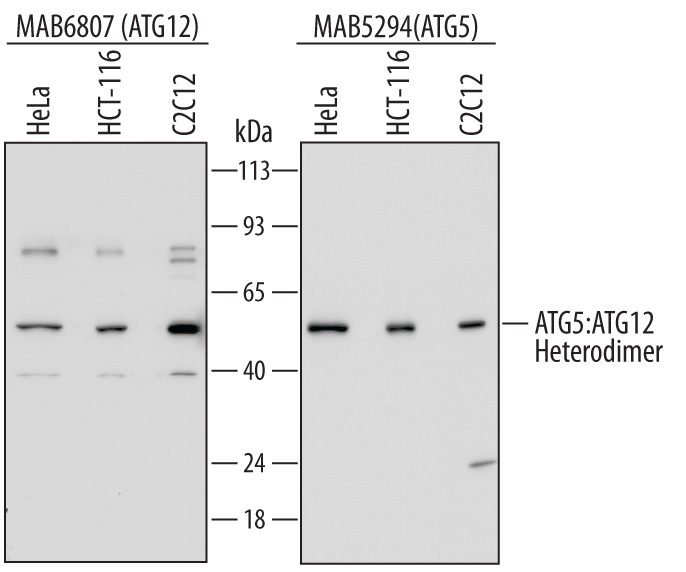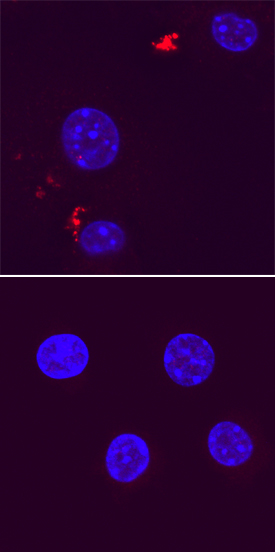Human/Mouse ATG12 Antibody Summary
Asp48-Ala187
Accession # O94817
Applications
Please Note: Optimal dilutions should be determined by each laboratory for each application. General Protocols are available in the Technical Information section on our website.
Scientific Data
 View Larger
View Larger
Detection of Human and Mouse ATG12 by Western Blot. Western blot shows lysates of HeLa human cervical epithelial carcinoma cell line, HCT-116 human colorectal carcinoma cell line, and C2C12 mouse myoblast cell line. PVDF membrane (left) was probed with 0.1 µg/mL of Mouse Anti-Human ATG12 Monoclonal Antibody (Catalog # MAB6807) followed by HRP-conjugated Anti-Mouse IgG Secondary Antibody (Catalog # HAF007). For additional reference, PVDF membrane (right) was probed with 0.5 µg/mL of Mouse Anti-Human/Mouse/Rat ATG5 Monoclonal Antibody (Catalog # MAB5294) followed by HRP-conjugated Anti-Mouse IgG Secondary Antibody (Catalog # HAF007). A specific band was detected for the ATG5:ATG12 heterodimer at approximately 60 kDa (as indicated). This experiment was conducted under reducing conditions and using Immunoblot Buffer Group 2.
 View Larger
View Larger
ATG12 in RAW 264.7 Mouse Cell Line. ATG12 was detected in immersion fixed RAW 264.7 mouse monocyte/macrophage cell line untreated (lower panel) or stimulated with LPS (upper panel) using Mouse Anti-Human/Mouse ATG12 Monoclonal Antibody (Catalog # MAB6807) at 15 µg/mL for 3 hours at room temperature. Cells were stained using the NorthernLights™ 557-conjugated Anti-Mouse IgG Secondary Antibody (red; Catalog # NL007) and counterstained with DAPI (blue). Specific staining was localized to autophagosomes. View our protocol for Fluorescent ICC Staining of Non-adherent Cells.
Reconstitution Calculator
Preparation and Storage
- 12 months from date of receipt, -20 to -70 °C as supplied.
- 1 month, 2 to 8 °C under sterile conditions after reconstitution.
- 6 months, -20 to -70 °C under sterile conditions after reconstitution.
Background: ATG12
ATG12 is a 15 kDa cytosolic protein with a C-terminal ubiquitin-like domain. The conjugation of ATG12 to ATG5 is required for the autophagosome pathway of bulk degradation. The ATG5:ATG12 heterodimer associates noncovalently with an ATG16 multimer to generate autophagosomes. The ATG5:ATG12 conjugate also inhibits type I interferon-induced antiviral responses and promotes the lipidation of ATG8. Alternate splicing of human ATG12 generates an isoform that lacks the ubiquitin-like domain. Human ATG12 shares 89% and 85% aa sequence identitiy with mouse and rat ATG12, respectively.
Product Datasheets
Citations for Human/Mouse ATG12 Antibody
R&D Systems personnel manually curate a database that contains references using R&D Systems products. The data collected includes not only links to publications in PubMed, but also provides information about sample types, species, and experimental conditions.
2
Citations: Showing 1 - 2
Filter your results:
Filter by:
-
Regorafenib Regulates AD Pathology, Neuroinflammation, and Dendritic Spinogenesis in Cells and a Mouse Model of AD
Authors: KM Han, RJ Kang, H Jeon, HJ Lee, JS Lee, H Park, S Gak Jeon, K Suk, J Seo, HS Hoe
Cells, 2020-07-09;9(7):.
Species: Mouse
Sample Types: Whole Tissue
Applications: IHC -
ATG12 deficiency leads to tumor cell oncosis owing to diminished mitochondrial biogenesis and reduced cellular bioenergetics
Authors: H Liu, Z He, N Germi?, H Ademi, Ž Frangež, A Felser, S Peng, C Riether, V Djonov, JM Nuoffer, C Bovet, I Mlinari?-R, I Zlobec, M Fiedler, A Perren, HU Simon
Cell Death Differ., 2019-12-16;0(0):.
Species: Human
Sample Types: Protein, Whole Cells, Whole Tissue
Applications: ICC, IHC-P, Western Blot
FAQs
No product specific FAQs exist for this product, however you may
View all Antibody FAQsReviews for Human/Mouse ATG12 Antibody
Average Rating: 5 (Based on 1 Review)
Have you used Human/Mouse ATG12 Antibody?
Submit a review and receive an Amazon gift card.
$25/€18/£15/$25CAN/¥75 Yuan/¥2500 Yen for a review with an image
$10/€7/£6/$10 CAD/¥70 Yuan/¥1110 Yen for a review without an image
Filter by:

